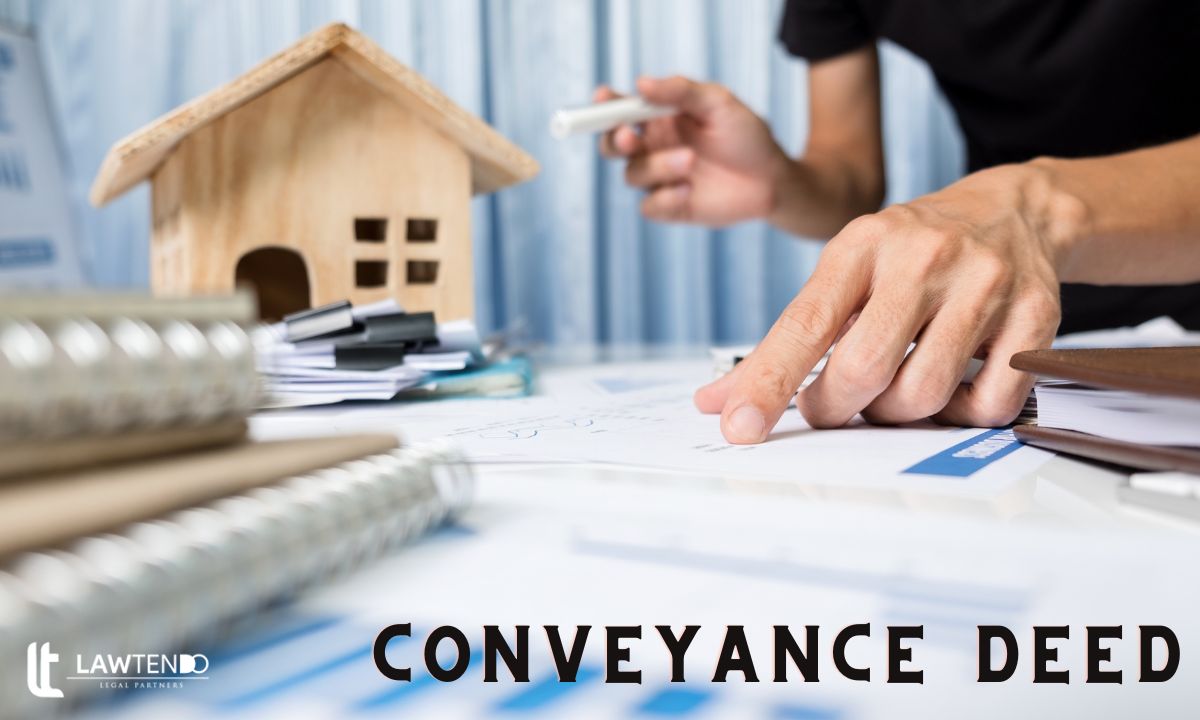Required Documents For Conveyance Deed

Date : 20 Oct, 2023
Post By admin
A conveyance deed is a legal document used in real estate transactions to transfer property ownership from one party to another. It is also known as a property deed or a transfer deed. This document is critical to the property transfer process and helps establish legal ownership.
A conveyance deed is a legal document used to transfer the property title from one person to another as a gift, an exchange, a lease, a mortgage, etc. A gift deed, mortgage deed, lease deed, or sale deed can also be called a conveyance deed.
At Lawtendo, we understand the intricacies involved in real estate transactions and are committed to simplifying the process for our clients. One crucial aspect of property transactions is the preparation and execution of conveyance deeds. We offer comprehensive Conveyance Deed Assistance services to ensure a smooth and legally sound transfer of property ownership.
Key elements of a conveyance deed typically include:
- Parties Involved: The deed will identify the parties involved in the transaction. The party selling or transferring the property is usually referred to as the "grantor," and the party receiving the property is the "grantee."
- Property Description: The deed must provide a detailed and accurate description of the property being transferred. This typically includes information about the property's boundaries, location, and any improvements on the land.
- Consideration: This section outlines the amount of money or other consideration exchanged for the property. In some cases, deeds may be used for gifts or other non-monetary transactions.
- Granting Clause: This is a crucial part of the deed where the grantor formally conveys or transfers the property to the grantee. It often uses specific legal language, such as "convey and warrant" or "grant, bargain, and sell."
- Covenants and Warranties: The deed may contain various covenants and warranties made by the grantor, which can vary depending on the type of deed. Common covenants include the covenant of seisin (promising that the grantor has legal ownership of the property), the covenant against encumbrances (promising that the property is free from liens or encumbrances), and the covenant of quiet enjoyment (promising that the grantee will have undisturbed possession of the property).
- Signatures: The deed should be signed by the grantor in the presence of witnesses and a notary public. The number of witnesses required and specific notarization requirements can vary by jurisdiction.
- Delivery and Acceptance: To be valid, the deed must be delivered to and accepted by the grantee. This process confirms the intent to transfer the property.
Required Documents For Conveyance Deed :
The specific required documents for obtaining a conveyance deed can vary based on jurisdiction, the type of property, and other factors. However, here is a general list of commonly required documents in a property transaction involving a conveyance deed:
- Purchase Agreement or Contract: This document outlines the terms and conditions of the property sale, including the purchase price, contingencies, and other important details. It serves as the initial agreement between the buyer and seller.
- Conveyance Deed: The main document in question, the conveyance deed, is prepared to transfer the legal ownership of the property from the seller (grantor) to the buyer (grantee).
- Title Report or Title Search: A title report or search is conducted to verify the property's ownership history and uncover any existing liens, encumbrances, or title issues. This report helps ensure that the title is clear and marketable.
- Property Survey: A property survey provides a detailed map of the property's boundaries and dimensions, ensuring accuracy in the conveyance deed's property description.
- Property Tax Records: Documentation related to property taxes, including current tax assessments, outstanding tax payments, and any applicable exemptions, may be required.
- Notary Acknowledgment: In many jurisdictions, the conveyance deed must be notarized, and a notary acknowledgment is attached to confirm the signatures' authenticity.
- Witness Affidavits: Depending on local requirements, witnesses may be required to sign affidavits attesting to the proper execution of the deed.
- Proof of Identity: Copies of government-issued identification, such as driver's licenses or passports, for both the buyer and seller are often necessary.
- Payment Records: Receipts or proof of payment for any taxes, recording fees, or transfer taxes associated with the property transfer.
- Previous Deeds: Copies of previous deeds, especially if there have been prior transfers of the property, can help establish a clear chain of title.
- Power of Attorney (if applicable): If either party is represented by an attorney-in-fact through a power of attorney document, a copy of this document may be required.
- FIRPTA Certification (for non-U.S. sellers): If the seller is not a U.S. citizen or resident alien, they may need to provide a FIRPTA (Foreign Investment in Real Property Tax Act) certification.
- Marriage Certificate or Divorce Decree (if applicable): In cases where marital status affects property rights, these documents may be necessary.
- Trust Documents (if applicable): If the property is held in a trust, relevant trust documents may be required.
- Death Certificate (if applicable): In cases involving inheritance, a death certificate of the deceased owner may be necessary to establish the grantor's authority.
Conclusion:
It's important to consult with legal professionals and local authorities to ensure that you have all the necessary documents specific to your jurisdiction and the unique circumstances of your property transaction. Additionally, the buyer and seller should work closely with their respective legal representatives to facilitate the process and ensure compliance with all required documentation.





